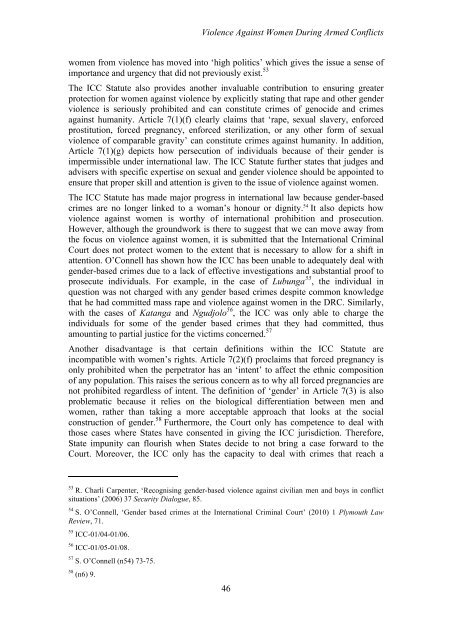Open UKLSR Volume 1(2) - Uklsa
Open UKLSR Volume 1(2) - Uklsa
Open UKLSR Volume 1(2) - Uklsa
You also want an ePaper? Increase the reach of your titles
YUMPU automatically turns print PDFs into web optimized ePapers that Google loves.
Violence Against Women During Armed Conflicts<br />
women from violence has moved into ‘high politics’ which gives the issue a sense of<br />
importance and urgency that did not previously exist. 53<br />
The ICC Statute also provides another invaluable contribution to ensuring greater<br />
protection for women against violence by explicitly stating that rape and other gender<br />
violence is seriously prohibited and can constitute crimes of genocide and crimes<br />
against humanity. Article 7(1)(f) clearly claims that ‘rape, sexual slavery, enforced<br />
prostitution, forced pregnancy, enforced sterilization, or any other form of sexual<br />
violence of comparable gravity’ can constitute crimes against humanity. In addition,<br />
Article 7(1)(g) depicts how persecution of individuals because of their gender is<br />
impermissible under international law. The ICC Statute further states that judges and<br />
advisers with specific expertise on sexual and gender violence should be appointed to<br />
ensure that proper skill and attention is given to the issue of violence against women.<br />
The ICC Statute has made major progress in international law because gender-based<br />
crimes are no longer linked to a woman’s honour or dignity. 54 It also depicts how<br />
violence against women is worthy of international prohibition and prosecution.<br />
However, although the groundwork is there to suggest that we can move away from<br />
the focus on violence against women, it is submitted that the International Criminal<br />
Court does not protect women to the extent that is necessary to allow for a shift in<br />
attention. O’Connell has shown how the ICC has been unable to adequately deal with<br />
gender-based crimes due to a lack of effective investigations and substantial proof to<br />
prosecute individuals. For example, in the case of Lubunga 55 , the individual in<br />
question was not charged with any gender based crimes despite common knowledge<br />
that he had committed mass rape and violence against women in the DRC. Similarly,<br />
with the cases of Katanga and Ngudjolo 56 , the ICC was only able to charge the<br />
individuals for some of the gender based crimes that they had committed, thus<br />
amounting to partial justice for the victims concerned. 57<br />
Another disadvantage is that certain definitions within the ICC Statute are<br />
incompatible with women’s rights. Article 7(2)(f) proclaims that forced pregnancy is<br />
only prohibited when the perpetrator has an ‘intent’ to affect the ethnic composition<br />
of any population. This raises the serious concern as to why all forced pregnancies are<br />
not prohibited regardless of intent. The definition of ‘gender’ in Article 7(3) is also<br />
problematic because it relies on the biological differentiation between men and<br />
women, rather than taking a more acceptable approach that looks at the social<br />
construction of gender. 58 Furthermore, the Court only has competence to deal with<br />
those cases where States have consented in giving the ICC jurisdiction. Therefore,<br />
State impunity can flourish when States decide to not bring a case forward to the<br />
Court. Moreover, the ICC only has the capacity to deal with crimes that reach a<br />
53 R. Charli Carpenter, ‘Recognising gender-based violence against civilian men and boys in conflict<br />
situations’ (2006) 37 Security Dialogue, 85.<br />
54 S. O’Connell, ‘Gender based crimes at the International Criminal Court’ (2010) 1 Plymouth Law<br />
Review, 71.<br />
55 ICC-01/04-01/06.<br />
56 ICC-01/05-01/08.<br />
57 S. O’Connell (n54) 73-75.<br />
58 (n6) 9.<br />
46


